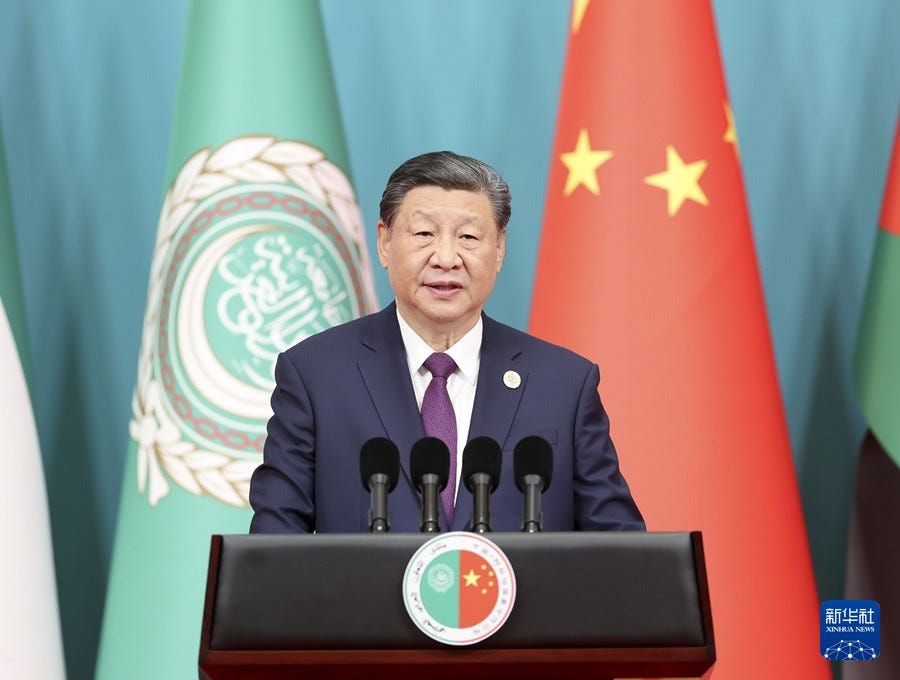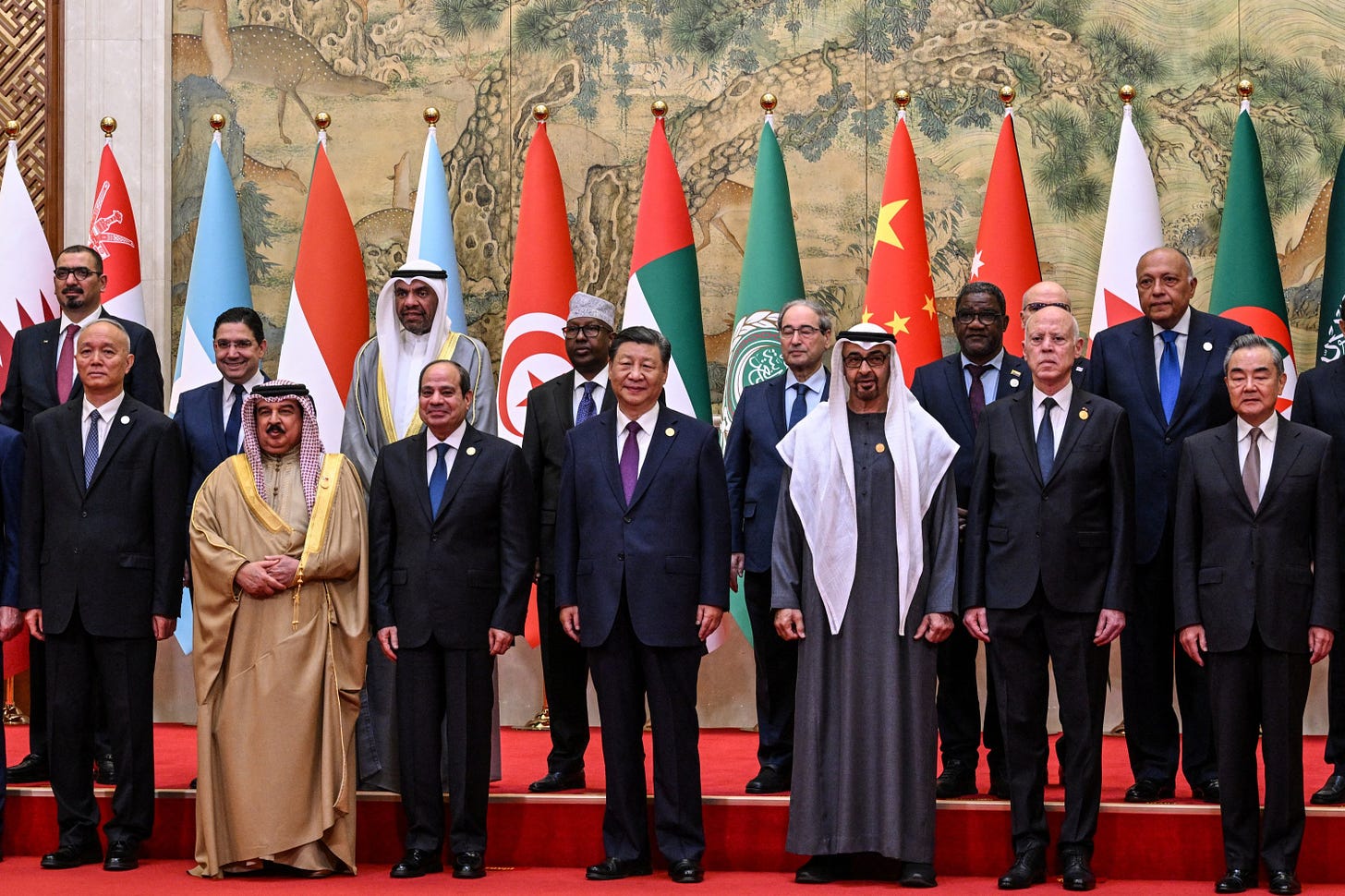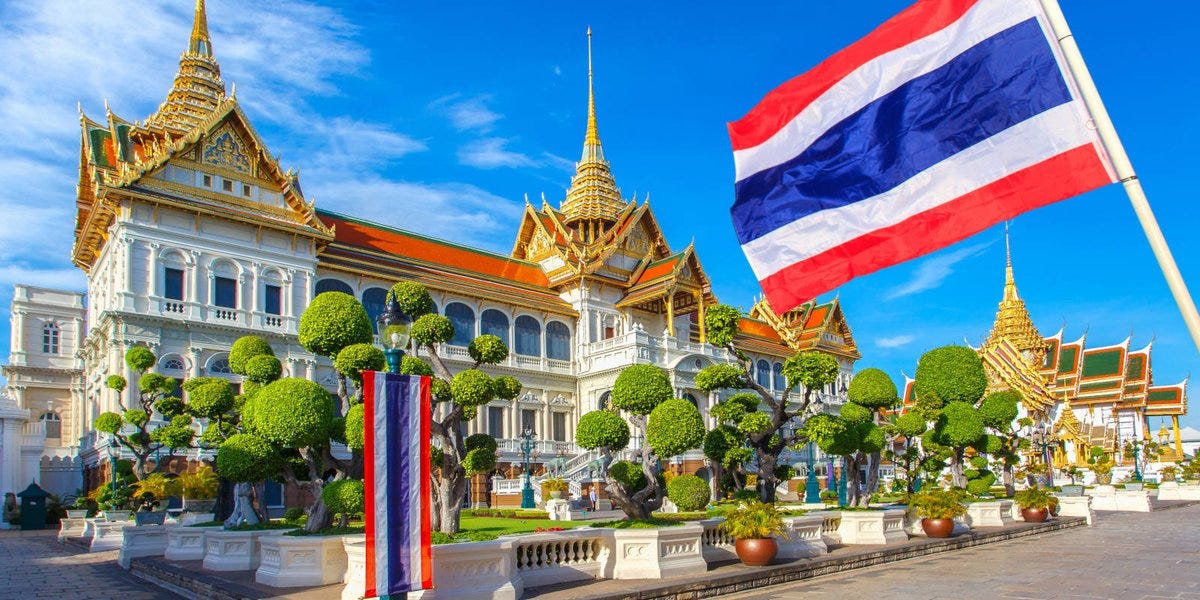From Conflict to Commerce
China’s Five cooperation frameworks to advance ties with Arab states, Arab leaders in Beijing, Thai Cabinet approves BRICS membership bid, Arab leaders in Beijing.
China’s Five cooperation frameworks to Advance ties with Arab States
By CGTN
On June 25, 2023, two China-funded prototype satellites of the MisrSat II satellite project were delivered to the Egyptian side, making Egypt the first African country with the capacity to assemble, integrate and test satellites.
The project marked a landmark outcome of jointly building the Belt and Road Initiative between China and Arab countries.
"China will work with the Arab side in the spirit of equality and mutual benefit to make our relations a fine example of high-quality Belt and Road cooperation," Chinese President Xi Jinping said on Thursday in Beijing. He made the remarks while delivering a keynote speech at the opening ceremony of the 10th ministerial conference of the China-Arab States Cooperation Forum.
Five cooperation frameworks
Xi proposed the "five cooperation frameworks" during the ceremony to step up the building of a China-Arab community with a shared future.
China will build with the Arab side a joint space debris observation center, a BeiDou application and a cooperation and development center and step up cooperation in manned space mission and passenger aircraft in efforts to boost innovation cooperation.
Xi called for enhancing cooperation on artificial intelligence (AI) to empower the real economy and promote a global governance system on AI. To promote economic and trade ties, China will accelerate the negotiations on bilateral and regional free trade agreements and advance the dialogue mechanism for e-commerce cooperation, he said.
China has signed Belt and Road cooperation documents with all 22 Arab countries and the League of Arab States, under which more than 200 major projects have been implemented, benefiting nearly two billion people on both sides.
Xi said China will also work with the Arab side in the spirit of inclusiveness and mutual learning to advance people-to-people exchanges.
Cultural exchanges between China and Arab states have been flourishing, with increasingly deepened cooperation in language learning and education.
More Chinese students are coming to Arab countries to learn the language and culture. Meanwhile, six Arab states, namely the United Arab Emirates, Saudi Arabia, Palestine, Egypt, Tunisia and Djibouti, have officially incorporated Chinese language courses into their national education systems.
Additional $69 million assistance for Gaza
In his speech, Xi reiterated that China supports Palestine's full membership in the United Nations (UN) and supports a more broad-based, authoritative and effective international peace conference.
In addition to the previous 100 million yuan (about $13.8 million) of emergency humanitarian assistance, Xi announced providing an additional 500 million yuan ($69 million) in assistance to help ease the humanitarian crisis in Gaza and support post-conflict reconstruction.
China will also donate $3 million to the UN Relief and Works Agency for Palestine Refugees in the Near East in support of its emergency humanitarian assistance to Gaza.
China mediated the historic reconciliation between Saudi Arabia and Iran and has been making diplomatic efforts to facilitate peace and stability among Arab states.
At the invitation of China, representatives of the Palestinian National Liberation Movement (Fatah) and the Islamic Resistance Movement (Hamas) had come to Beijing for talks on promoting intra-Palestinian reconciliation and achieved positive progress, Chinese Foreign Ministry spokesperson Lin Jian said on April 30.
"As an Arab saying goes, friends are the sunshine in life. We will continue to work with our Arab friends to carry forward the spirit of China-Arab friendship, build together a better future and make the road sunny toward a China-Arab community with a shared future," Xi said on Thursday.
Arab leaders in Beijing
By The New Arab
Arab leaders attend the China-Arab States Cooperation Forum in Beijing to enhance trade and energy cooperation and address Israel's war on Gaza. Arab leaders attended the China-Arab States Cooperation Forum in Beijing this week, which focused on strengthening trade and energy cooperation, as well as addressing Israel's war on Gaza.
Bahrain’s King Hamad bin Isa Al Khalifa, Egypt’s President Abdul Fattah al-Sisi, Tunisia’s President Kais Saied, UAE President Sheikh Mohammed bin Zayed Al Nahyan and Arab League Secretary-General Ahmed Aboul Gheit were among those attending.
President Xi Jinping is set to deliver a keynote speech at the opening ceremony on Thursday aimed at building a "common consensus" between China and Arab states.
Beijing has sought to build closer ties with Arab states in recent years, and last year brokered a detente between Iran and its long-time rival Saudi Arabia.
It has also historically been sympathetic to the Palestinian cause and supportive of a two-state solution to the Israeli-Palestinian conflict.
And Beijing last month hosted rival Palestinian groups Hamas and Fatah for "in-depth and candid talks on promoting intra-Palestinian reconciliation". Top of the agenda will be the war between Israel and Hamas, which Xi has called for an "international peace conference" to resolve.
China sees a "strategic opportunity to boost its reputation and standing in the Arab world" by framing its efforts to end that conflict against US inaction, Ahmed Aboudouh, an associate fellow with the Chatham House Middle East and North Africa Programme, told AFP.
"This, in turn, serves Beijing's focus on undermining the US's credibility and influence in the region," he said. "The longer the war, the easier for China to pursue this objective," he added.
On Tuesday, Foreign Minister Wang Yi met with counterparts from Yemen and Sudan in Beijing, saying he hoped to "strengthen solidarity and coordination" with the Arab world.
He also raised China's concerns over disruptive attacks on Red Sea shipping by Iran-backed Houthi forces acting in solidarity with Hamas with his Yemeni counterpart Shayea Mohsen al-Zindani.
"China calls for an end to the harassment of civilian vessels and to ensure the safety of waterways in the Red Sea," state news agency Xinhua quoted him as saying.
In recent years, economic relations between China and the Arab world have notably strengthened, growing beyond a need for Gulf oil as various trade sectors have witnessed cooperation and investment pledges from both sides.
However, China's ongoing persecution of its Uyghur Muslim minority, which has seen hundreds of thousands of people detained, tortured, and abused on account of their ethnic and religious background has negatively affected its image in the Arab world, but most Arab governments have stayed silent on this.
Recently China’s interest in having a voice in mediation efforts in the Gaza war has also been apparent, illustrated most recently by a meeting in Beijing between Fatah and Hamas in late April aimed at reconciliation between the two rival Palestinian factions after years of discord.
Thai Cabinet approves BRICS membership bid
By Yang Wanli (China Daily Global)
Thailand declared its strategic move to become a member of the BRICS economic bloc, further deepening its engagement with global emerging economies. A draft letter indicating Thailand's intent on becoming a member of BRICS was approved at a cabinet meeting on Tuesday, government spokesperson Chai Wacharonke said.
BRICS has a policy to expand beyond its current members, and has invited nonmember countries to attend the 16th BRICS Summit, which is scheduled to be held in Kazan, Russia, in October.
The letter, drafted by the Thai Ministry of Foreign Affairs, stated that Thailand has placed importance on multilateralism and the increased representation of developing countries in the international system, which is in line with BRICS principles.
Thailand is currently in a queue of 15 countries being considered for admission. Chai said attending the event would be an opportunity for Thailand to accelerate the membership process and enhance its role as a leading player among developing nations.
BRICS was founded in 2009 by its namesake countries Brazil, Russia, India and China. South Africa was the first beneficiary of an expansion of the bloc in 2010. Egypt, Ethiopia, Iran, Saudi Arabia and the United Arab Emirates joined the group at the beginning of this year — the second round of the bloc's expansion that was approved at the 15th BRICS Summit.
BRICS now comprises almost 46 percent of the world's population, 36 percent of global GDP and 25 percent of world trade, measured in terms of exports, according to some research papers.
The guiding principles, standards, criteria and procedures for BRICS expansion have been decided in accordance with the BRICS objective of strengthening cooperation under the three pillars of political and security, economic and financial, and cultural and people-to-people cooperation.
Thailand has also officially announced that it wants to apply to join the Organisation for Economic Co-operation and Development, which groups 38 of the world's most developed economies, the Bangkok Post reported.






